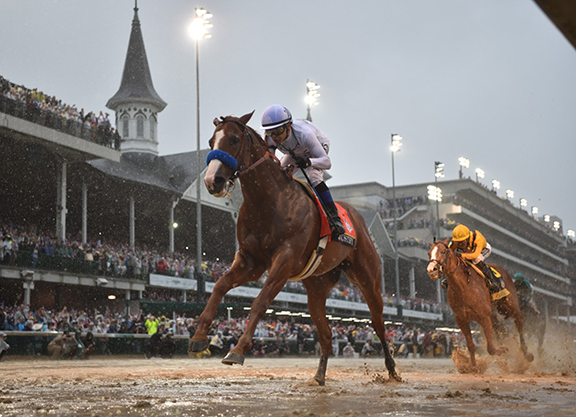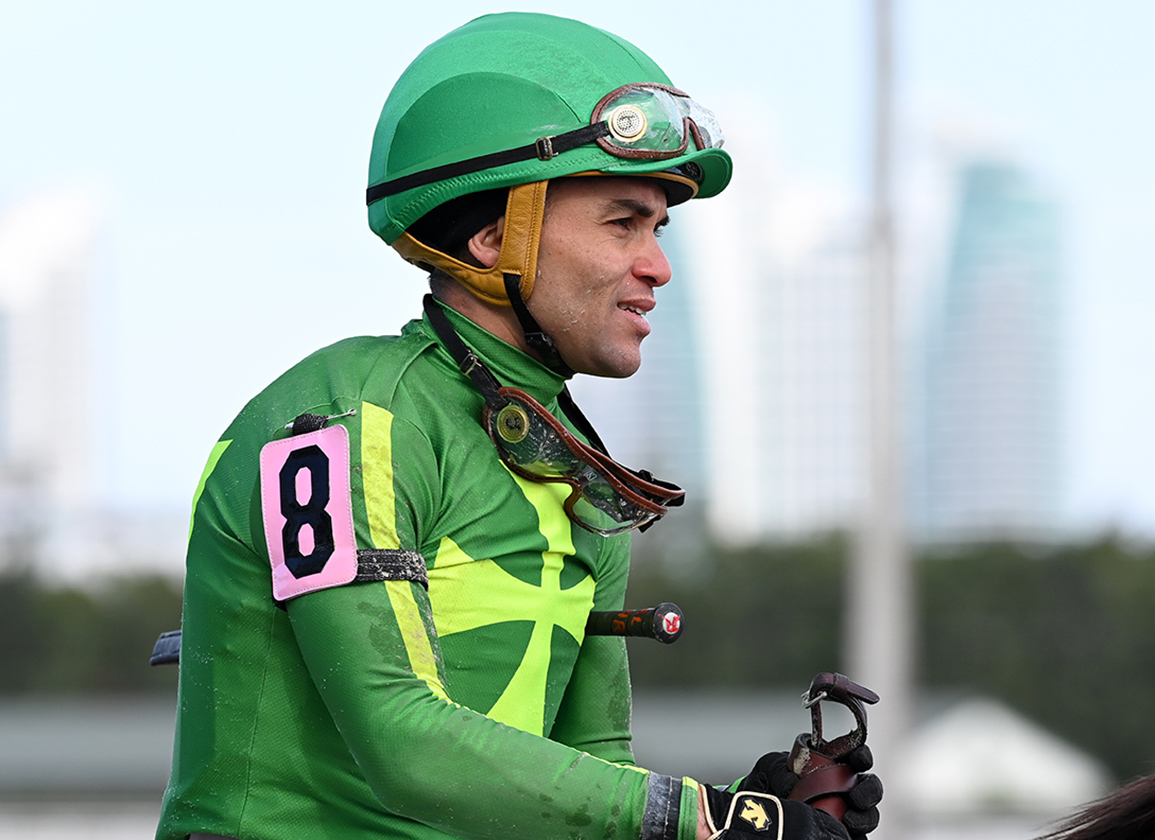Triple Crown winner Justify, champion Gun Runner, and jockey Joel Rosario lead a class of nine new members to be inducted this year to the National Museum of Racing's Hall of Fame. In addition to those three entries–all in their first year of eligibility–jockey Abe Hawkins and racehorses Aristides and Lecomte have been selected by the Pre-1900 Historic Review Committee; and Harry F. Guggenheim, Clement L. Hirsch, and Joe Hirsch were chosen by the Pillars of the Turf Committee.
Joel Rosario, 39, a native of Santo Domingo, Dominican Republic, has won 3,604 races through Apr. 20 and ranks fourth all time in North American purse earnings with $318,313,804 in a career that began in 2003. He has ranked among the top 10 in North American earnings 15 times, including topping the list in 2021 with a career-best $32,956,215. He has also ranked in the top 10 in wins five times.
The Eclipse Award winner for outstanding jockey in 2021, Rosario won the 2013 GI Kentucky Derby with Orb and the GI Belmont S. with Tonalist (2014) and Sir Winston (2019). He has won 15 Breeders' Cup races, including the Classic with champion Accelerate (2018) and Horse of the Year Knicks Go (2021).
Gun Runner (Candy Ride {Arg}–Quiet Giant, by Giant's Causeway) won the Eclipse Awards for Horse of the Year and champion older male in 2017. Racing from 2015 through 2018, he compiled a record of 12-3-2 from 19 starts and earnings of $15,988,500, the second-highest total of any North American-based horse (behind Hall of Famer Arrogate).
Trained by Hall of Famer Steve Asmussen for owners Winchell Thoroughbreds and Three Chimneys Farm, Gun Runner's championship season in 2017 included Grade I wins in the Breeders' Cup Classic, Woodward, Whitney, and Stephen Foster.
As a 3-year-old in 2016, he won the GI Clark H. He made one start in 2018 prior to being retired, winning the GI Pegasus World Cup. Overall, he won races at seven different tracks.

Gun Runner with Goncalvo Torrealba, Scott Blasi, and Ron Winchell | Sarah Andrew
Justify (Scat Daddy–Stage Magic, by Ghostzapper) became America's 13th Triple Crown winner and was voted the Eclipse Award winner for Horse of the Year and champion 3-year-old male in 2018. Trained by Hall of Famer Bob Baffert for owners China Horse Club, Head of Plains Partners, Starlight Racing, and WinStar Farm, he crossed the finish line first in all six of his career starts, spanning 111 days from his career debut on Feb. 18, 2018, through his Belmont S. victory on June 9.
The three contemporary selections were chosen by a nationwide voting panel of 177 members from a group of 17 finalists submitted by the Hall of Fame's Nominating Committee. To be elected, finalists are required to receive 50% plus one vote (majority approval) from the voting panel after earning two-thirds support from the Nominating Committee to advance to the ballot.
Abe Hawkins earned nicknames including “The Black Prince,” “The Dark Sage of Louisiana,” and “The Slayer of Lexington” for his prowess as a jockey in the pre- and post-Civil War years. Arguably the most celebrated rider in America prior to Isaac Murphy and the first Black athlete to gain national prominence, Hawkins is remembered foremost for his victory aboard Lecomte vs. Lexington at the Metairie Course in New Orleans on April 1, 1854. That day, Hawkins piloted Lecomte to a record 7:26 for the distance of four miles to hand Lexington the lone defeat in his Hall of Fame career.
An enslaved person on Duncan Kenner's Ashland plantation in Louisiana, Hawkins won a documented 25 races from 1864 through 1866 and countless informal and undocumented events during the course of his career. Hawkins first appeared as a
rider at Metairie in 1851 and rode for Kenner for a decade beginning in 1854. After the Civil War, as a free man, Hawkins went north and achieved celebrity and fortune, particularly at Saratoga Race Course, Jerome Park, and the course at Paterson, N.J.
Bred in Kentucky by his owner, H. P. McGrath, Aristides (Leamington–Sarong, by Lexington), a chestnut colt foaled in 1872, won the inaugural Kentucky Derby in 1875. Trained by Hall of Famer Ansel Williamson, Aristides, a week before the Derby, finished out of the money in the Phoenix Hotel S. He came back in the Derby before a crowd of 10,000 to defeat Volcano by a length. His time of 2:37 3/4 was the fastest ever to that date by a 3-year-old for 1 1/2 miles.
Bred in Kentucky by Gen. Thomas Jefferson Wells, Lecomte (Boston–Reel, by Glencoe), a chestnut colt foaled in 1850, made his debut at the Metairie Course in New Orleans on April 5, 1853, in a 2-year-old sweepstakes at mile heats. Lecomte won both mile heats, including a time of 1:45 1/2 in the second heat, the fastest ever raced in America at the time. He returned to win at two-mile heats at the Pharsalia Course in Mississippi before winning three races in three weeks back at Metairie to remain undefeated through five starts. His victory on Jan. 6, 1854, was in mile heats against Sallie Ward, considered one of the best mares in the South prior to the Civil War. Lecomte was finally defeated when he met up with Hall of Famer Lexington
in the Great State Post Stakes in consecutive four-mile heats.
A week later, Lecomte met Lexington again in the Jockey Club Purse, again at four-mile heats. Lecomte won the first heat by six lengths in 7:26, more than six seconds faster than the record set by Hall of Famer Fashion a dozen years earlier. Lecomte won the second heat by four lengths in 7:38 3/4, which handed Lexington the lone defeat of his career.
Lecomte then won the Association Purse in Mississippi and walked over for another purse two days later before returning to New Orleans and winning another Jockey Club purse. Early in 1855, Lecomte had won nine of 10 races and owned American records for one and four miles.
The Museum's Historic Review Committee considered only candidates from before 1900 this year. The committee will review the era of 1900 through 1959 in 2025 and 1960 through 2000 in 2026.
Harry F. Guggenheim was a leading figure in the fields of publishing, mining, government service, aeronautics, and philanthropy. Born in New Jersey in 1890, Guggenheim developed a passion for racing after graduating from Cambridge University. He became a significant figure in the sport as an owner, breeder, and industry leader.
Under the name Cain Hoy Stable, Guggenheim won 540 races as an owner with purse earnings of $6.2 million. He also bred the winners of 1,230 races (those horses earned $8.7 million). Cain Hoy campaigned 1953 Kentucky Derby winner Dark Star (a
$6,500 purchase and the only horse to defeat Native Dancer), champion Bald Eagle (back-to-back winner of the Washington, D.C., International), and Hall of Fame member Ack Ack (who raced for Buddy Fogelson and wife Greer Garson after Guggenheim's death and was Horse of the Year in 1971).
Cain Hoy-bred standouts included champions Crafty Admiral and Never Bend; Kentucky Oaks winners Lalun (1955), Hidden Talent (1959), Make Sail (1960), and Sally Ship (1963); Bold Reason, winner of the American Derby, Hollywood Derby and Travers S. in 1971; San San, winner of the 1972 Prix de l'Arc de Triomphe; and multiple stakes winner One-Eyed King.
Guggenheim, who was elected to The Jockey Club in 1951, was the leading breeder in total earnings in England and Ireland in 1963.
Along with Hall of Fame members John W. Hanes and Christopher T. Chenery, Guggenheim outlined a plan for a non-profit to reorganize New York racing in the 1950s, which eventually led to the creation of the New York Racing Association.
In 1969, with his health failing, Guggenheim dispersed all his stock except his stallions and homebred colt Ack Ack. His breeding stock went to Keeneland's fall sale that year and his horses in training were sold at Belmont Park for a gross of $4,751,200 for 137 head, a record gross for a dispersal.
Clement L. Hirsch was born in 1914 in St. Louis into a successful family of retail merchants. In 1936, Hirsch founded the Dog Town Packing Company in Vernon, Calif., which became a prominent pet food producer he later renamed Kal Kan Foods, Inc. He also was the founder of Stagg Foods of Costa Mesa, which he built into a major producer of canned chili. He sold Stagg Foods in 1996 to Hormel Foods.
Hirsch purchased his first racehorse in 1947. During his more
than 50 years as an owner, Hirsch employed only two trainers. He first hired Robert H. “Red” McDaniel, then Warren Stute, who remained with him for more than 40 years. A member of The Jockey Club, Hirsch was successful with a number of horses imported from South America, among them the colt Figonero, who won the 1969 Hollywood Gold Cup. He was also successful with the filly Magical Maiden, who won the 1991 Hollywood Starlet and the 1992 Las Virgenes S. In 1993, Magical Maiden won the Chula Vista H. at Del Mar, a race that track officials later renamed the Clement L. Hirsch H.
While successful racing horses, Hirsch is best remembered in the sport as a co-founder and President of the Oak Tree Racing Association. In 1968, the operators of Del Mar decided to cancel their fall racing program and to host only a summer meet.
Hirsch, along with businessman/racehorse owner Louis R. Rowan, veterinarian Dr. Jack Robbins, and other racing enthusiasts, formed Oak Tree to annually host a fall meet at Santa Anita Park. It proved to be successful and Hirsch served as its president from its inception until his death in 2000. The Oak Tree meetings also benefited numerous racing charities.
Born in New York City in 1928, Joe Hirsch enjoyed a prolific journalism career that carried him from the eras of Citation and Native Dancer to the dawn of the 21st century. He earned a degree in journalism from New York University, then served in the United States Army for four years. Following his time in the military, Hirsch worked briefly for The New York Times before joining the staff at The Morning Telegraph. He then transitioned to its companion publication, Daily Racing Form, where he spent 49 years (1954 through 2003) and became one of racing's most visible and impactful figures. Hirsch became the Form's executive columnist in 1974 and held that title until his retirement.
Through his omnipresent and comprehensive reporting and personal access to the leaders and prominent participants in the sport, Hirsch became highly influential and used his platform to become one of the game's greatest ambassadors.
The Joe Hirsch Media Roll of Honor at the National Museum of Racing and Hall of Fame was created in his honor in 2010 to recognize career excellence in media. Additionally, the press boxes at Churchill Downs and Saratoga are named in his honor, as are journalism scholarships at the University of Kentucky and one through the National Thoroughbred Racing Association.
The Joe Hirsch Turf Classic Invitational, a Grade I grass race, is held each fall in New York.
“Joe Hirsch was much more than just the dean of American racing writers for half a century. He was a global ambassador for the sport, a mentor to two generations of journalists, and probably the most universally respected figure in the world of horse racing,” said Steven Crist, a longtime colleague of Hirsch and former publisher of Daily Racing Form.
The 2024 Hall of Fame class will be enshrined Aug. 2, at the Fasig-Tipton sales pavilion in Saratoga Springs at 10:30 a.m. The ceremony will be broadcast live on the Museum website at www.racingmuseum.org. The event is free and open to the public.
Not a subscriber? Click here to sign up for the daily PDF or alerts.







